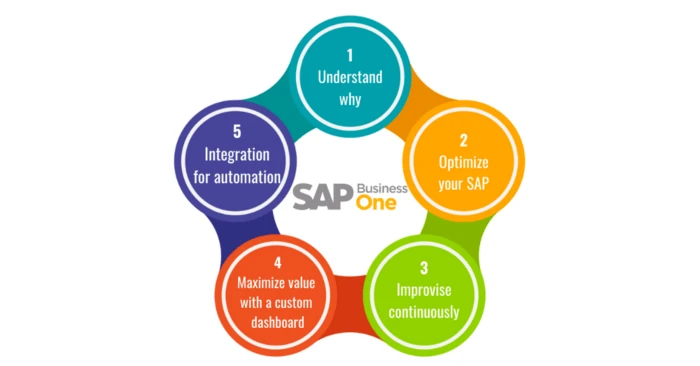In today’s fast-paced and ever-evolving business landscape, organizations across various industries are constantly striving to stay competitive, streamline their operations, and enhance their overall efficiency. Enterprise Resource Planning (ERP) systems have emerged as invaluable tools to achieve these goals. Among the top contenders in the ERP market, SAP Business One (SAP B1), offered by Osswal Infosystem, stands out for its ability to cater to the unique needs of different industries. This blog will explore how SAP B1 addresses these distinct requirements and helps organizations thrive in their respective sectors.
Understanding the Versatility of SAP B1
Before delving into specific industries, it’s crucial to understand why SAP B1 is considered a versatile and robust ERP solution. SAP B1 is designed to provide an integrated and holistic approach to managing various business processes, from finance and accounting to inventory and customer relationship management. Its scalability, user-friendliness, and adaptability make it an attractive choice for small and mid-sized enterprises (SMEs) and larger organizations.
The key to SAP B1’s success in meeting the unique needs of various industries lies in its ability to be highly customizable. This ERP system can be tailored to align with the specific processes, regulations, and demands of different sectors, ensuring that businesses can leverage their full potential. Now, let’s explore how SAP B1 caters to the distinct requirements of some prominent industries.
Manufacturing Industry
Manufacturing companies often deal with complex supply chains, production processes, and inventory management. SAP B1 provides a comprehensive solution by enabling manufacturers to:
- Streamline Production: SAP B1 offers production planning and scheduling tools that optimize manufacturing operations, ensuring efficient resource allocation and reduced downtime.
- Inventory Management: Real-time inventory tracking and reporting help manufacturers maintain optimal stock levels, reducing carrying costs and minimizing stockouts.
- Quality Control: Manufacturers can implement robust quality control processes and track product quality at every stage, ensuring compliance with industry standards.
- Regulatory Compliance: SAP B1 supports compliance with industry-specific regulations and reporting requirements, simplifying audits and reducing the risk of non-compliance.
Retail and E-commerce
The retail and e-commerce sectors require agility and adaptability to respond to changing consumer trends. SAP B1 addresses these needs by:
- Demand Forecasting: Advanced analytics and reporting tools enable retailers to anticipate customer demand and adjust inventory accordingly, reducing overstock and understock situations.
- Multi-Channel Sales: SAP B1 facilitates seamless integration with various sales channels, allowing retailers to manage online and offline sales operations from a single platform.
- Customer Engagement: Enhanced CRM capabilities help retailers personalize customer interactions, improve loyalty, and drive repeat business.
- Inventory Optimization: Real-time visibility into inventory levels and automated reorder points help retailers maintain optimal stock levels while minimizing carrying costs.
Healthcare and Life Sciences
In the highly regulated healthcare and life sciences industry, SAP B1 offers features such as:
- Compliance Management: Robust compliance tools help organizations adhere to stringent regulations, such as FDA requirements, and maintain meticulous records.
- Patient Data Security: Data encryption and secure access controls ensure the confidentiality and integrity of patient information, complying with HIPAA and GDPR regulations.
- Supply Chain Visibility: End-to-end visibility into the supply chain ensures the timely availability of critical medical supplies and pharmaceuticals.
- Financial Management: Accurate financial reporting and budgeting capabilities aid in managing the complex financial transactions often associated with healthcare.
Professional Services
Professional services firms rely on efficient project management and resource allocation. SAP B1 offers features to support these needs, including:
- Project Management: Integrated project management tools enable firms to plan, execute, and monitor projects, ensuring on-time delivery and profitability.
- Resource Allocation: Efficiently allocate resources based on project requirements, skills, and availability, improving project success rates.
- Billing and Revenue Recognition: Automate billing processes and adhere to revenue recognition standards, simplifying financial management.
- Time and Expense Tracking: Streamline time and expense tracking, enhancing accuracy and transparency in client billing.
Agriculture and Agribusiness
In the agriculture sector, SAP B1 addresses specific challenges:
- Crop and Livestock Management: Monitor and manage crop cycles, livestock breeding, and disease control with specialized features.
- Supply Chain Optimization: Streamline the movement of agricultural products from farm to market, reducing waste and ensuring freshness.
- Compliance with Agricultural Standards: SAP B1 helps organizations comply with industry-specific regulations, such as food safety standards and traceability requirements.
- Resource Management: Optimize resource utilization, including land, labor, and equipment, to maximize productivity.
Conclusion
SAP B1, provided by Osswal Infosystem, proves to be a versatile and adaptable ERP solution that can address the unique needs of various industries. Its flexibility, customization capabilities, and comprehensive feature set make it an attractive choice for businesses looking to enhance efficiency, streamline operations, and stay competitive in their respective sectors.
Whether you operate in manufacturing, retail, healthcare, professional services, agriculture, or any other industry, SAP B1 can be tailored to align with your specific requirements. By choosing SAP ERP, organizations can effectively navigate the challenges and capitalize on the opportunities presented by their industry, ultimately achieving sustainable growth and success.



